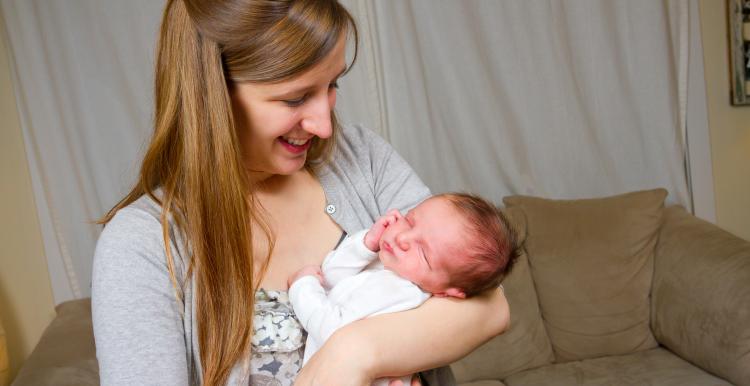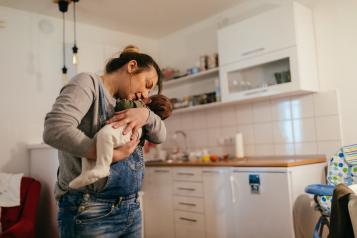Mental health and the journey to parenthood: Jane's story

Having to push to be heard about baby’s health problems
“When our second son was born in 2016, we diagnosed him with silent reflux at a few weeks old. Trying to give him medication from a bottle was a nightmare. I was breastfeeding and wanted to do combination feeding, but he wasn’t up for that.
For months I went to the GP every week saying, ‘He’s not well, something is wrong with him.’
My son was comfort eating to help with the burn he was feeling in his throat, so he put on weight and was therefore considered by doctors to be thriving. But he was miserable.”
The impact of caring for an unhappy baby
“This all went on for months and my son was really unhappy during that period, and it had a profound effect on me. I really felt myself decline. I was struggling, and I was very teary. (In 2005 I was diagnosed with bulimia and depression, which was successfully treated with CBT and medication, and I could feel I was on a downhill struggle.)
I told my husband that I wasn’t coping, as I needed him to know. He helped and was watching out for me. Just telling him helped.
I was up in the night all the time with our son, and then having to function during the day. A lot of it was down to sleep deprivation.
Then I had a horrible night where I didn’t want the baby anywhere near me. I couldn’t settle him. I didn’t want to feed him or touch him. It was such a horrible feeling that I said I need to see a doctor.”
Online mental health support that helped
“The doctor would always ask how I was doing, so when I went in and said, ‘I’m falling apart, I need you to help me now,’ I felt confident that she would listen to me.
I was put on sertraline (an antidepressant). I had a 1:1 chat where they diagnosed me with low mood and anxiety and gave me an online course to do. The next space on a postnatal depression (PND) course was a few months away, so I put my name down and said we’d see how the online course went and if I still felt like I needed more help, I’d do that too.
The online course was reflective, so you had to look what would trigger the way you felt. I was asked questions about why I was responding in the way I did and given alternatives. I then had a follow-up call every week with a clinician to see how I felt.
I found it beneficial. Just having that hour to sit and do that without disturbances from the children made a big difference.
At the end I didn’t feel I needed the PND course too. I didn’t want to take a space from someone who needed it more.”
A problem that could have been avoided
“I kept going to the doctor weekly about my son because I thought that if I kept knocking on their door and saying he’s not happy, the persistence would mean that someone would eventually say ‘We need to do something about this.’
At one point I took my husband along to a GP appointment with me and broke down in floods of tears. I said that this wasn’t just affecting me, but our whole family. They finally gave us some new medication, and we later went to see a doctor privately who doubled the dose. My son was then more settled and happier, and he started sleeping more.
My son is almost three now and it took two and a half years to get the referral that he needed to a paediatric gastroenterologist to find out what he’s got, which is gastritis. We also discovered that he’s anaemic.
I love the NHS, but that’s a long journey to get answers. Two and a half years of him being uncomfortable.
The changes that Jane would like to see made for other mums
For professionals to listen to mums
“The mum does know best. If a mum is coming to you and saying there’s a problem, nine times out of ten there probably is. The baby’s only way to tell you is to cry and it really takes it out of you.
My son’s reflux journey really linked to my mental health difficulties. If your baby isn’t happy, somewhere along the line you’re not going to be happy either. If you feel you’re not being listened to, it will drag you down.
They were on the ball with me when I said I needed mental health support, but it felt like a long battle to get my son what he needed. It could have been avoided.
They need to consider families as a whole. It wasn’t until I was there with my husband and saying, ‘This is affecting everyone’ that they got onto it.”
Support to move away from medication
“I went to my GP in 2018 and said I’d like to come off my antidepressants. He said I should wait until my children are both in school and life is a bit easier. I was surprised at that response. I don’t want to need medication to be a parent and be in control of myself.
Surely the aim should be to get me off them. It feels like the response is: We’ve treated the issue, you’re functioning again, off you go.
There have been times when I’ve forgotten or run out of my tablets and the crash kicks in two days later and it’s horrible. I would like there to be support people about how to move away from medication in a controlled way. Perhaps having a mum group to go to would help, to talk to people who’ve had similar issues with their babies.
Someone who can listen. Ideas to help you reduce medication and support you as you do it. Motherhood is so unrelenting that there’s no time when there isn’t someone to look after.”
More realistic antenatal classes
“I’d like there to be a more realistic approach to antenatal classes. The breastfeeding video they show suggests it’ll be simple and easy, and it’s not always like that - and that’s OK. You don’t want to remove the excitement of motherhood, but it would be good if they could be more realistic – explaining to expectant parents that the journey isn’t always plain sailing would help a lot.
NCT say they are with you for the first 100 days...there’s a hell of a lot that can happen in those 100 days, and they need to make sure that parents are prepared for the good... and the not so good. And let you know that it’s all OK, whatever the journey.
Organisations shouldn’t be afraid to say to people that motherhood can be hard. If you don’t, the feeling of failure is going to set in a lot quicker.
Have you been affected by this story?
If the content of this story causes you to think of anything that has happened to you or someone you know and you feel upset, worried or uncomfortable, please see the Maternal Mental Health Alliance's support page for a list of services who may be able to help.


